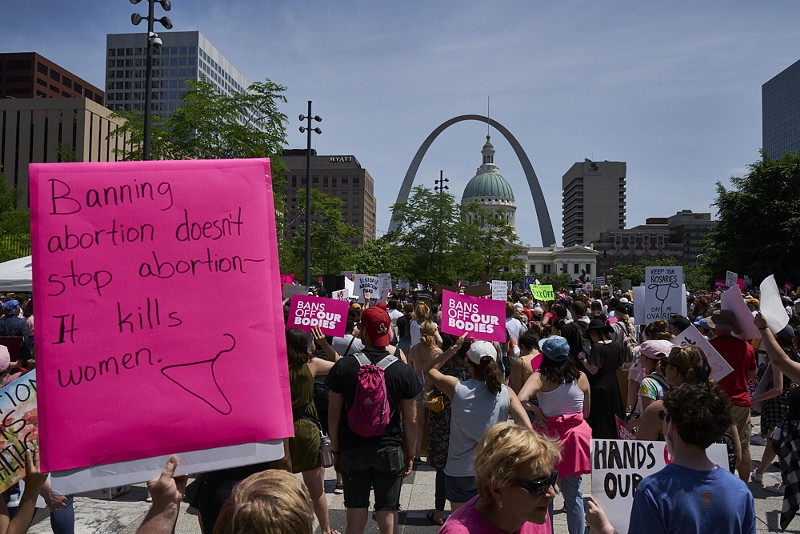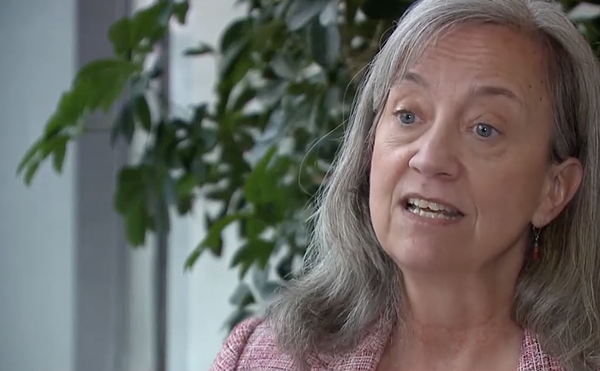Attorney General Eric Schmitt has signed an opinion to effectively end abortion in the state of Missouri after the U.S. Supreme Court issued a ruling today overturning Roe v. Wade, the landmark case that guaranteed a federal right to an abortion for nearly five decades.
Overturn of Roe activated a law in Missouri that outlaws abortion except in cases of medical emergency. The law makes no exceptions for incest or rape.
Missouri’s so-called “trigger law” only takes effect after the fall of Roe and action by some of the state’s top government officials — either through a legal opinion by Attorney General Eric Schmitt, a proclamation by Governor Mike Parson, or an adoption of a resolution by the state legislature.
Schmitt stated last month he was “immediately prepared” to issue this opinion if Roe was overturned. Within moments of the decision, he signed an opinion, making Missouri perhaps the first state in the country to end abortion.🚨 BREAKING 🚨 Following the SCOTUS ruling overturning Roe v. Wade, Missouri has just become the first in the country to effectively end abortion with our AG opinion signed moments ago. This is a monumental day for the sanctity of life. pic.twitter.com/Jphy72R4rq
— Attorney General Eric Schmitt (@AGEricSchmitt) June 24, 2022
The "trigger law," officially called the Right to Life of the Unborn Child Act, punishes anyone who knowingly performs or induces an abortion. Doing so would become a Class B felony, punishable by up to 15 years in jail. Medical providers who perform or induce an abortion risk losing their license.
Friday’s ruling from the Supreme Court comes seven weeks after news site Politico published a draft version of the Supreme Court’s opinion.
While pro-choice advocates mourn the confirmation of their fears, today’s ruling comes as no surprise. Anticipation of an eradication of abortion access began long before Politico leaked the Supreme Court’s draft opinion to overturn Roe in May.
Missouri’s legislature has restricted abortion access for years. From 2009 to 2019, the number of abortions performed in the state plummeted from 6,881 to 167, according to the state Department of Health and Senior Services. Local abortion providers say even fewer have been performed in recent years.
Meanwhile, abortions will skyrocket in "safe haven states" like Illinois.
“Our local abortion clinics are expecting a 200% increase in patients in the coming months as Illinois will become a safe haven, not just for Missouri but for the whole surrounding reason,” says Mallory Schwarz, executive director of Pro-Choice Missouri.
In a Thursday interview with the RFT, Dr. Colleen McNicholas, chief medical officer for Planned Parenthood of the St. Louis Region and Southwest Missouri, said Southern Illinois Planned Parenthood expected to see an additional 15,000 patients.
That number may seem like a lot, but abortion providers in neighboring Illinois have prepared for the “inevitable fall of Roe” for years, according to McNicholas.
“Because we are uniquely positioned to have been dealing with Missouri’s constant attack on abortion access, this is a moment we’ve been preparing for for years,” McNicholas says.
With the Hope Clinic for Women in Granite City, Planned Parenthood launched a Regional Logistics Center earlier this year to help patients find lodging, transportation or financial assistance as they pursue reproductive health care.
McNicholas says Planned Parenthood Southern Illinois and the Hope Clinic for Women have the physical capacity to handle more patients. However, both clinics could use more staff in order for them to increase operations, either by lengthening the clinics’ daily hours of operation or staying open an additional day.
“Like many healthcare industries across the country right now, staffing is difficult,” McNicholas says. “We’re doing what we can to hire more folks so that as patients from across the country are making their way to Illinois, we can open more spots, so we can see folks for more hours a day and eventually likely see folks seven days a week.”
In addition to Missouri, 12 other states have similar trigger laws that would effectively ban abortion in their states. Many of these states are nearby, such as Arkansas, Kentucky, Oklahoma and Tennessee.
St. Louisans have had reasonable access to abortion at clinics directly across the Mississippi River, but that could change, Schwarz said Thursday in anticipation of today’s ruling.
“Once this decision comes down, that access will change because of the number of people across the country that will be forced to flee their states to access quality health care,” Schwarz says, pointing to a need for cities to adopt legislation similar to a new St. Louis Board of Aldermen bill. Board Bill 61 would create Reproductive Equity Fund to help organizations with logistical support.
To accommodate this increase in need, Illinois abortion providers have called on Illinois Governor J.B. Pritzker to direct more funding to clinics.
“The abortion care network is incredibly resilient and adaptable, and will continue to do everything that it can to support patients for as long has it can, but it is not sustainable in its current form,” McNicholas says. “If Illinois and if Governor Pritzker are to live up to the promise that Illinois will be a beacon… then it is critical that they put some dollars behind that.”







